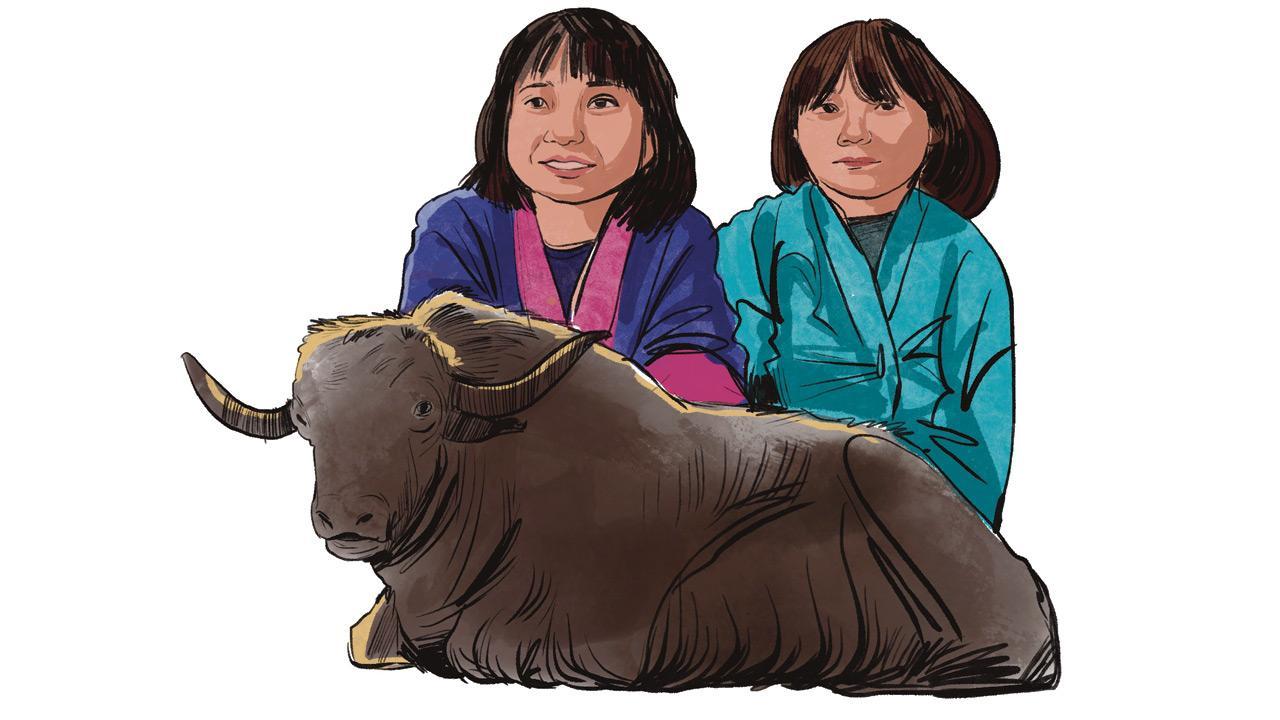The film’s achievements, including the Oscar nomination, are amazing, given that Bhutan has hardly any film industry to speak of

Illustration/Uday Mohite
![]() It is perhaps the sweetest wake-up call for Indian cinema. Tiny Bhutan has effortlessly beat India, the big film bully in the neighbourhood, as the Bhutanese Pawo Choyning Dorji’s charming film Lunana: a Yak in the Classroom, has earned an Oscar nomination in a key category, for Best International Feature. With Dorji’s very first feature, in the Dzongkha language, he is up against some heavyweight fellow nominees: Ryusuke Hamaguchi’s Drive My Car (Japan), Jonas Poher Rasmussen’s Flee (Denmark), Paolo Sorrentino’s The Hand of God (Italy), and Joachim Trier’s The Worst Person in the World (Norway).
It is perhaps the sweetest wake-up call for Indian cinema. Tiny Bhutan has effortlessly beat India, the big film bully in the neighbourhood, as the Bhutanese Pawo Choyning Dorji’s charming film Lunana: a Yak in the Classroom, has earned an Oscar nomination in a key category, for Best International Feature. With Dorji’s very first feature, in the Dzongkha language, he is up against some heavyweight fellow nominees: Ryusuke Hamaguchi’s Drive My Car (Japan), Jonas Poher Rasmussen’s Flee (Denmark), Paolo Sorrentino’s The Hand of God (Italy), and Joachim Trier’s The Worst Person in the World (Norway).
ADVERTISEMENT
Dorji is in Hollywood, and seen dressed in an elegant red gho (knee-length Bhutanese robe), with his American-Taiwanese actress-producer wife Stephanie Lai. The Oscar award ceremony will be held on March 27. Your jaw drops as you watch Ang Lee, no less, interviewing Dorji on YouTube, but the disarming, gorgeous, long-maned, Buddhist Dorji, remains unruffled. Rintu Thomas and Susmit Ghosh of India, are also in Hollywood, having earned an Oscar nomination for Best Documentary Feature for Writing with Fire, on Khabar Lahariya, India’s only newspaper run by Dalit women. Congratulations to all of them!
For Dorji, this is a giant leap for an indie film with a mainly amateur crew, “one camera made in 2014 and two lights” and powered only by solar energy, as there was no electricity in Lunana. This 2019 film was earlier at the BFI London, Busan and Palm Springs film festivals.
The India-born Dorji, who grew up in India, Europe and America, studied political science at Lawrence University, Wisconsin, US, then studied Buddhism and lived in India, and reconnected with his roots. He shuttles between India, Bhutan and Taiwan.
A photographer, he first worked as Khyentse Norbu’s assistant on the film Vara: A Blessing, then was one of the producers on Norbu’s Hema Hema: Sing me a Song While I Wait, that won a Special Mention at Toronto. Lunana is only the second film submitted to the Oscars from Bhutan.
In Lunana: a Yak in the Classroom, Ugyen Dorji (Sherab Dorji) is a pop singer who is keen to migrate to Australia, but is obliged, as part of mandatory government service, to serve as a teacher in a school in remote Lunana, eight days away. Ugyen bides his time till he can migrate, but he hadn’t planned that his little student Pem Zam (mishti personified), Saldon the singer, and other locals would hijack his heart with their simplicity and innocence. He is also gifted a yak in the classroom, for handy dung to feed the fire in the cold. Dorji’s relationship with Pem Zam reminds me of Ratan and the postmaster in Satyajit Ray’s Teen Kanya/Postmaster.
The direction is unfussy and goes straight to your heart. Sherab Dorji is good; the rest are mostly locals playing themselves. The screenplay is a classic journey of hate turning to love, but it’s for a village, and reveals a fine ear for rough-hewn beauty and a sense of community (“I like offering songs…When the black-necked crane sings, it doesn’t worry who hears it or what others think.”). Restrained, the film also avoids easy butterscotch happy endings. The crew are mostly amateurs. Jigme Tenzing’s cinematography is gorgeous (oh, that shot of blue mountains with a row of donkeys walking in black silhouette; and other mountain scenes with wreathes of mist); Ku Hsiao-Yun’s editing is effective, and there are lovely local songs. The film is produced by Pawo Choyning Dorji (Dangphu Dingphu: A 3 Pigs Production), Steven Xiang, Stephanie Lai and Honglin Jia; backed by Samuel Goldwyn Films (distributor, N America) and Huanxi Media (China). The film’s achievements, including the Oscar nomination, are amazing, given that Bhutan has hardly any film industry to speak of. India has a lot to learn from this small, indie, multi-national gem. Very best at the Oscars.
Meenakshi Shedde is India and South Asia Delegate to the Berlin International Film Festival, National Award-winning critic, curator to festivals worldwide and journalist.
Reach her at meenakshi.shedde@mid-day.com
 Subscribe today by clicking the link and stay updated with the latest news!" Click here!
Subscribe today by clicking the link and stay updated with the latest news!" Click here!







